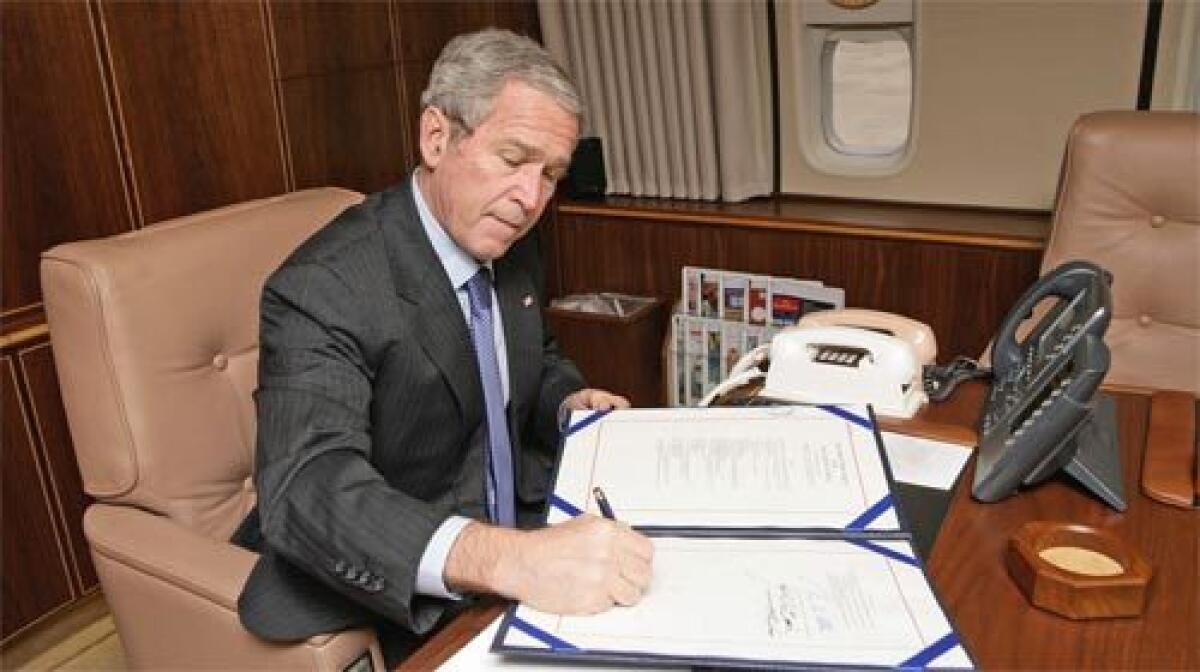Bush signs $555-billion spending bill

CRAWFORD, TEXAS — President Bush signed a $555-billion spending bill Wednesday that will pay for a large share of government operations in 2008, but he complained that Congress did not do enough to restrict pork-barrel expenditures and was not providing enough money for the wars in Iraq and Afghanistan.
Bush said in a statement: “I am disappointed in the way the Congress compiled this legislation. . . . Congress dropped into the bill nearly 9,800 earmarks that total more than $10 billion. These projects are not funded through a merit-based process and provide a vehicle for wasteful government spending.”
Bush said he hoped Congress would help “rein in government spending” when he submitted his 2009 budget proposal in February.
White House Deputy Press Secretary Scott Stanzel said the president had asked for options to curb special-interest spending. Stanzel told reporters aboard Air Force One that “no decisions have been made,” but that Bush had asked Jim Nussle, director of the Office of Management and Budget, to “look at avenues by which the federal government can address those earmarks.”
Stanzel said Bush signed the budget measure soon after boarding the aircraft. The president is continuing a winter vacation that began Friday at Camp David in Maryland and is scheduled to run until New Year’s Day at his home near here.
Stanzel said Bush also signed a bill that froze the alternative minimum tax for one year. If Congress had not acted, the tax would have affected an estimated 25 million Americans for the first time next year.
The spending bill includes a provision that limits commercial development at the West Los Angeles Veterans Affairs campus in Brentwood and Westwood. The measure, which bars the Department of Veterans Affairs from signing long-term commercial agreements to develop and sell the land, was inserted by Sen. Dianne Feinstein (D-Calif.). The Bush administration wanted to open the 388-acre complex to commercial business, estimating the value at $4 billion.
“Now we have a property that’s dedicated as a permanent soldiers’ home,” said Keith Jeffreys, an Army veteran and president of the Culver City-based nonprofit Citizens for Veterans’ Rights.
In his written statement, Bush signaled that Congress’ attempts to specify a date for withdrawal from Iraq would continue to be met with White House resistance. Calling the appropriations bill’s provisions for military spending “a down payment,” he said Congress “should quickly take action next year to provide the remainder of the funding needed by our troops.”
Ending a months-long standoff with the president, Congress last week completed work on the legislation, which covers government spending through Sept. 30, 2008. Although Congress stayed close to the overall spending limit that Bush sought, it shifted billions of dollars to meet the Democratic majority’s priorities.
james.gerstenzang
@latimes.com
Neuman reported from Washington and Gerstenzang from Crawford. Times staff writer Molly Hennessy-Fiske in Los Angeles contributed to this report.
More to Read
Sign up for Essential California
The most important California stories and recommendations in your inbox every morning.
You may occasionally receive promotional content from the Los Angeles Times.










